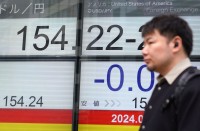
(Reuters) – Mexico’s telecommunications watchdog on Friday slapped regulations on Carlos Slim’s telephone company America Movil and two of his financial and industrial companies, as it seeks to rein in the multi-billionaire and boost competition.
Mexico is trying to open up its phone and TV industries following the passage last year of wide-ranging telecoms reform meant to claw back the vast market shares enjoyed by Mexico’s media players.
America Movil controls about 80 percent of Mexico’s fixed-line business via its Telmex unit and some 70 percent of the mobile sector through its Telcel unit. Customers have long complained about high prices and shoddy service.
As was widely expected, the Federal Telecommunications Institute (IFT) declared America Movil “dominant,” meaning it has an outsized share of the market. It also banned the company from charging national roaming fees.
The IFT also declared that Slim’s bank Inbursa and conglomerate Grupo Carso were dominant in telecommunications because of their “economic interests” in America Movil.
“A group of economic interest is a concept used within the framework of competition … It aims to identify all those who have the same commercial interest, and in this case they clearly form part of a group,” said Gabriel Contreras, head of the IFT.
“The disincorporation of assets is not foreseen in these measures … at this time,” he added, saying that the regulations would in general be implemented in 30 days.
America Movil said the regulator also imposed measures, including infrastructure sharing, regulation of interconnection fees and prohibited the company from acquiring exclusive rights to broadcast in Mexico high profile events such as the soccer World Cup finals.
Last year, America Movil secured rights on all media platforms to broadcast the 2016 Olympics in Rio de Janeiro.
America Movil shares, which are down 15 percent so far this year compared with an 8.9 percent fall in Mexico’s IPC index, were flat for most of the day, but closed 1.57 percent lower.
Both Inbursa and Grupo Carso said they were analyzing the IFT’s decision and would provide details on the steps they would take in response. Inbursa shares closed down 0.74 percent, while Grupo Carso fell 0.91 percent.
The rulings on Carso and Inbursa surprised many analysts, who took the action to mean that the IFT, which was given tough new powers under the reform, was serious about going after Slim.
“They’re saying: ‘I’m blocking Slim wherever I can.'” said Gerardo Roman, head of stock trading at the Actinver brokerage in Mexico City.
The telecoms reform allows the regulator to apply tougher rules to level the playing field for smaller competitors.
However, a break-up of dominant companies, although theoretically possible, looks unlikely in the foreseeable future. The head of the IFT has said it is only meant to be used as a “last resort” to spur competition.
Earlier on Friday, Televisa, which controls more than 60 percent of Mexico’s TV market, and which has long been accused of wielding too much political power, said it will be forced to share infrastructure.
GOLD MINE
Slim struck gold when Mexico privatized its telecoms industry in the early 1990s, using money generated by his phone business to build a vast corporate empire spanning mining to retail that gave him one of the world’s largest fortunes.
The dominance rulings are a part of a larger telecommunications overhaul and a key milestone in driving competition in Mexico’s telecoms and broadcasting sectors.
They have raised expectations that Mexico might finally tackle the extraordinary power enjoyed by a few companies in Latin America’s second-largest economy.
Televisa said the IFT also ruled that the company cannot hold a stake in a dominant telecoms operator. Its shares extended losses following the announcement, ending the day more than 2 percent lower.
“All of the resolutions and actions from the IFT affect Grupo Televisa in many areas associated with its (TV and pay-TV) businesses,” the company said.
Earlier on Friday, the IFT detailed the bidding process for concessions to create two new national television networks that would weaken the duopoly of Mexico’s two biggest players, Televisa and TV Azteca.
Together, the two broadcasters control about 95 percent of the broadcast television market.
The Ve Por Mas bank said the IFT decision was bad news for Televisa because it would dent revenue, restrict potential new business and create more competition since the company would be forced to share its infrastructure with rivals.
Shares of TV Azteca, which stands to benefit from the reform, were up more than 3 percent at 8.15 pesos.
Actinver’s Roman wondered whether the dominance ascribed to Carso and Inbursa could be a way for the IFT to prevent Slim from entering the public TV network auctions.
Slim has long aspired to penetrate the lucrative free-to-air television industry, but he has so far been barred from the market.
“Perhaps Inbursa, or perhaps Carso, which are both Slim companies, could go into the TV channel tenders. So, all they’re doing is blocking him so he can’t do that,” Roman added.







